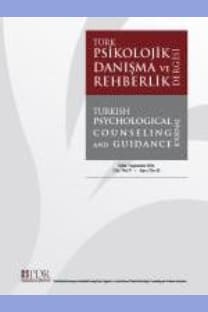Ergenler İçin Mantıkdışı İnançlar Ölçeğinin Geliştirilmesi: Geçerlik ve Güvenirlik Çalışmaları
Bu arastinnada, ergenligin ilk döneminde bulunan ögrencilerin mantikdisi inançlarinin ölçülmesine yönelik bir ölçme araci gelistirilmesi amaçlanmistir. Çalisma, ilkögretim okulu altinci, yedinci ve sekizinci siniflarinda ögrenim gören 694 ögrenci üzerinde yürütülmüstür. Ergenler Için Mantikdisi Inançlar Ölçegi (EMIÖ), üç alt ölçek ve 21 maddeden olusmaktadir. Ölçegin geçerlik çalismasinda faktör analizi, madde-test korelasyonlari, uyum geçerligi ve ayirt edici geçerlik teknikleri kullanilmistir. Güvenirlik çalismasinda ise Cronbach alfa ve test-tekrar test teknikleri kullanilmistir. Elde edilen bulgular, EMIÖ'nin geçerli ve güvenilir bir ölçme araci oldugunu göstennektedir.
Anahtar Kelimeler:
ANAHTAR SÖZCÜKLER: Mantıkdışı inançlar, geçerlik, güvenirlik, ölçek, ergenler
The Development of Irrational Beliefs Scale for Adolescents: Validity and Reliability Studies
The purpose of this study was to develop a scale to measure irrational beliefs of students in early adolescence. The subjects were 694 students who were recruited from elementary schooL. These students were in the 6th, 7th, and 8th grades. The Irrational Beliefs Scale for Adolescents (IBSA) is composed of
21 items and it has three subscales. For validity, factor analysis, item-test correlations, concurrent validity and discriminant validity; for reliability, Cronbach Alpha and test-retest techniques were used. Findings indicated that the IBSA was a valid and reliable scale.
Keywords:
-,
___
- Aydın, G. ve Aydın, 0. (I990). Otomatik Düşünceler Ölçeğinin Geçerlik ve Güvenirliği. Psikoloji Dergisi, ?(24), 51- 57.
- Bernard, M. E. ve Cronan, F. (1999). The Child and Adolescent Scale of Irrationality: Validation Data and Mental Health Correlates. Journal of Cognitive Psychotherapy: A n In- ternationai quarter-ly, 13(2), 121-132.
- Bilge, F. ve Arslan, A. (2001). Yetişkinlerin Akılcı Olmayan Düşüncelerinin Bazı Değişkenlere Göre İncelenmesi. Tiirlc Psikolojik Danışma ve Rehberlik Dergisi, 2(16), 23—3 1.
- Bilgin, M. (2004). Üçlü Ölçeğinin Geliştirilmesi: Geçerlik ve Güvenirlilc Çalışmaları. Türk Psikolojik Danışma ve Rehberlik Dergisi, 3(21), 35-41.
- DiGiuseppe, R. (1999). Rational Emotive Behavior Therapy 4th Ed. (Ed: H. T. Prout ve D. T. Brown). Counseling and Psychotherapy with Children and Adolescents. New York: John Wiley & Sons, 252-301.
- Dryden. W. ve Ellis, A. (1988). Rational—Emotive Therapy (Ed: K. S. Dobson) The Therapies. London: Hutchin— son, 214-236.
- Ellis, A. (1963). Reason and Emotion in Psychothera- py. New York: Lyle Stuart.
- Ellis, A. (1979a). Rational-Emotive Therapy. (Ed: A. Ellis ve J.M. Whiteley). T heoreticol and Empirical Foundations ofRational-Emotive Therapy California: Brooks/Cole Publish- ing Company, 1—6.
- Ellis, A. (l9'i9b). Toward a New Theory of Personal— ity. (Ed: A. Ellis ve J.M. Whiteley). Theoretical and Empirical Foundations ofRattonai—Emotive Therapy. California: Brooks Cole Publishing Company, 7-32.
- Ellis, A. (1989). ilgilendi—Emotive Therapy. (Ed: R. J. Corsini ve D. Wedding). Current Psychotherapies. Illinois: F. E. Peacock Publishers Inc., 197-238.
- Ellis, A. (2993). Fundamentals ofRational—Emotive Therapy for the 19905. (Ed: W. Dryden ve L. K. Hill) Innova— tions in Rational Emotive Therapy. Newbury Park: Sage Publi- cations, 1-32.
- Ellis, A. (2000). Rational Emotive Behaviour Thero- py. (Ed: R. Nelson-Jones). Six Key Approaches to Counselling and Therapy. London: Continuum, 181-227.
- Hamamcı. Z. (2002). Bilişsel Davranışçı Yaklaşımlar Bütünleştirilmiş Psikodrama Uygulamasının Kişilerarası ilişkilerle Ilgili Bilişsel Çarpıtmalar ve Temel İnançlar Üzerine Etkisi. Yayınlanmamış Doktora Tezi, Ankara Üniversitesi, So- syal Bilimler Enstitüsü, Ankara.
- Hooper, S. R. ve Layne, C. C. (1983). The Common Belief Inventory for Students: A Measure of Rationality in Chil- dren. Joıımol ofPersonality Assessment, 47(1), 85-90.
- Kassinove, H., Crisci, R. ve Tiegerman, S. (1977). Developmental Trends in Rational Thinking: Implications for Rational-Emotive School Mental Health Programs. Journal of Community Psycholog; 5, 266—274.
- Malouff, J. M. ve Schutte, N. S. ( 1986). Development and Validation of a Measure of Irrational Belief. Journal of Consulting and Clinical Psychology. 54(6), 860-862. Öner, N. (1990). Sınav Kaygısı Envanteri Elkitabı. İstanbul: Yüret Vakfı Yayını No:1. Öy, B. (1991). Çocuklar İçin Depresyon Ölçeği: Geçerlik ve Güvenirlik Çalışması. Türk Psikiyaıri Dergisi. 2(2), 132-135.
- Şahin, N. H. ve Şahin, N. ( 1991). Bir Kültürde Fonk— siyonel Olan Tutumlar Bir Başka Kültürde de Öyle midir? Fonksiyonel Olmayan Tutumlar Ölçeğinin Psikometrik Özel- likleri. Psikoloji Dergisi, 7(26), 30-40.
- Türküm, S. (1996). Biiığssei Davranışçı Yaklaşma Dayalı Grupla Psikolojik Danışmanın Bilişsel Çarpıtmaiar ve
- ISSN: 1302-1370
- Başlangıç: 1990
- Yayıncı: -
Sayıdaki Diğer Makaleler
Ergenler İçin Mantıkdışı İnançlar Ölçeğinin Geliştirilmesi: Geçerlik ve Güvenirlik Çalışmaları
Deprem Stresiyle Basa Çıkmanın İyimserlik ve Cinsiyete Göre İncelenmesi
BasariILI Bir BankacIda BulunmasI Beklenen Kişilik Özellikleri
Sınıf Rehberliği Öğrenme Yaşantılarının Düzenlenmesi
Yas Ölçeği: Geçerlik ve Güvenirlik Çalışması
İlişkilerde İnanç Envanterinin (IIE) Geliştirilmesi: Geçerlik ve Güvenirlik Çalışması
